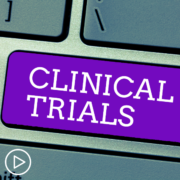When Should AML Patients Consider Joining a Clinical Trial?
When Should AML Patients Consider Joining a Clinical Trial? from Patient Empowerment Network on Vimeo.
With AML research advancing quickly, clinical trials are an important consideration when making a treatment decision. AML expert and researcher Dr. Omer Jamy discusses when joining a clinical trial may be appropriate.
Dr. Omer Jamy is a Leukemia and Bone Marrow Transplant Physician and Assistant Professor at the University of Alabama at Birmingham. Learn more about Dr. Omer Jamy.
Related Resources:

|

|

|
Transcript:
Katherine Banwell:
Dr. Jamy, when should AML patients consider joining a clinical trial?
Dr. Omer Jamy:
Yeah, that’s a very interesting question. No, I have my personal thoughts on that which I share. So, I feel like clinical trials are of different flavors. They range from early phase to late phase trials. I think being at a center where there’s opportunities to enroll in clinical trials is really helpful. Now if you have a newly diagnosed patient with AML, there is good standard of care treatment. Of course, they can be improved upon.
I would probably improve upon them in the setting of a Phase III where they get standard of care plus an additional agent versus placebo where at minimum, they’re getting standard of care, right? So, it will be very challenging unless it’s a very novel concept to enroll someone who has not seen any standard therapy on an earlier phase study. Let’s put it this way. Whereas it changes completely when they’ve relapsed meaning they’ve gone through options which are pretty standard. At that point, enrolling in the clinical trial is most likely in their best interest. I think because once leukemia relapses, we have limited options.
I think we’ve been lucky over the past five years that we’ve had several drugs approved. But there’s still probably less than 10. And out of those, not everybody is a candidate for each of those drugs. They’re targeting specific mutations. So, the relapse refractory setting I think enrolling in a clinical trial is really helpful. Up front I just take more interest in the clinical trial design and the consent form before agreeing to participate.










